Unit 1 Where did you go on vacation? Section A (1a-2d) 课件(42张PPT)2023-2024学年人教版八年级英语上册
文档属性
| 名称 | Unit 1 Where did you go on vacation? Section A (1a-2d) 课件(42张PPT)2023-2024学年人教版八年级英语上册 | 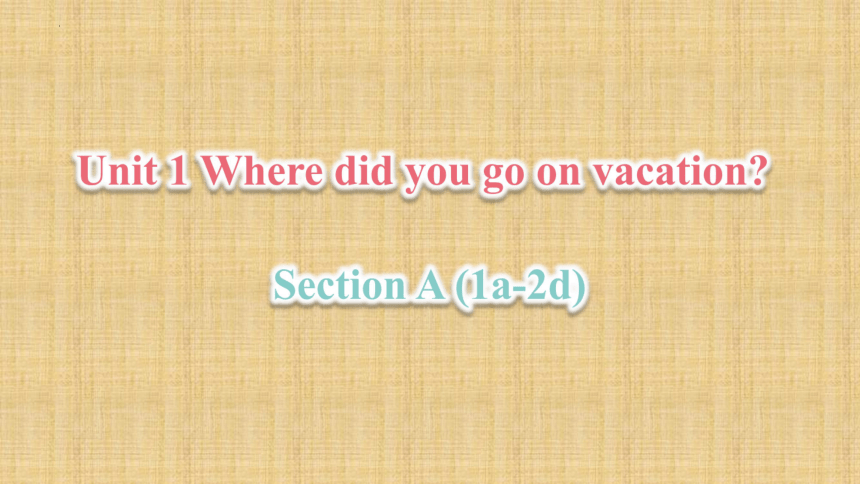 | |
| 格式 | pptx | ||
| 文件大小 | 4.8MB | ||
| 资源类型 | 教案 | ||
| 版本资源 | 人教新目标(Go for it)版 | ||
| 科目 | 英语 | ||
| 更新时间 | 2023-07-25 20:47:20 | ||
图片预览

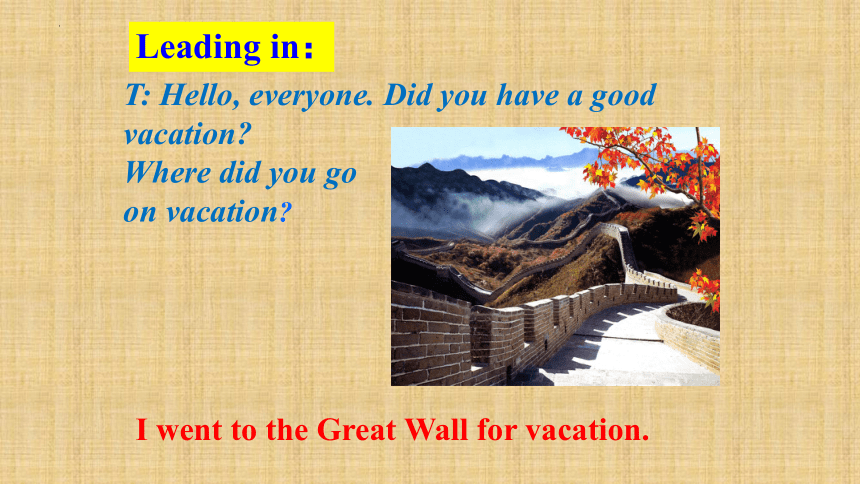
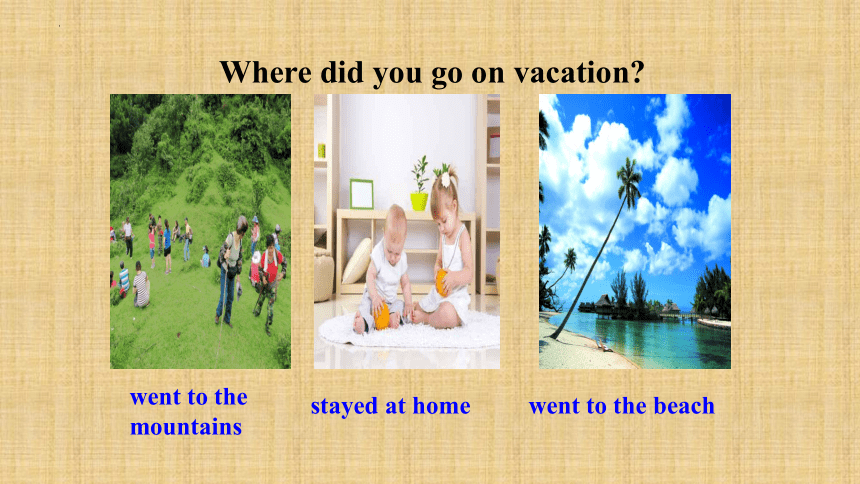
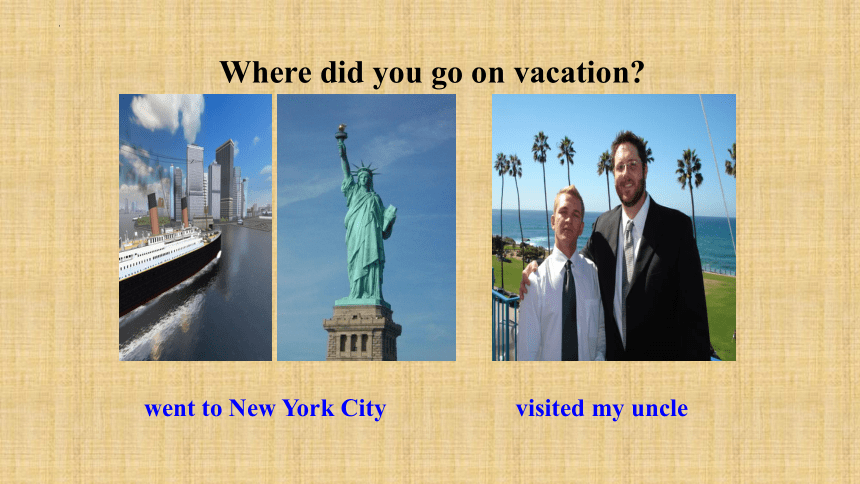
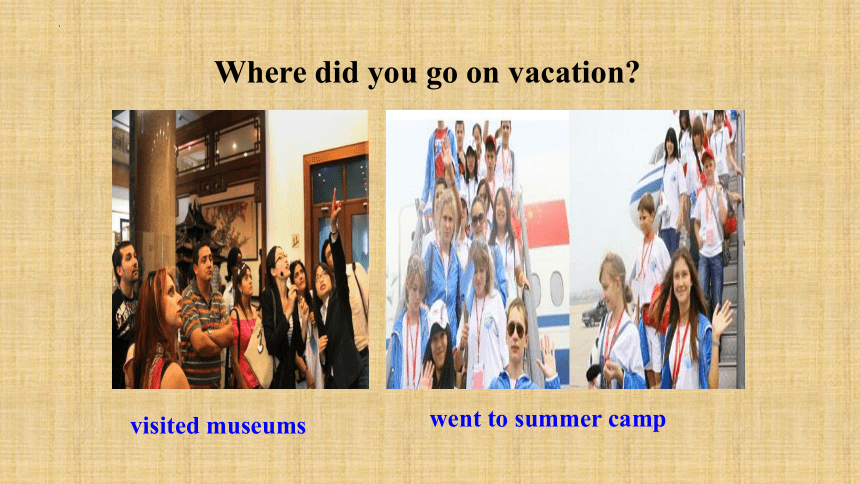
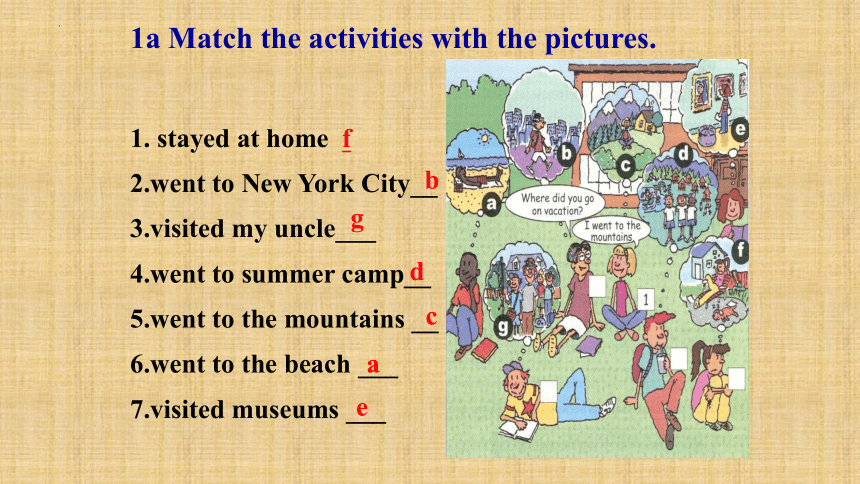
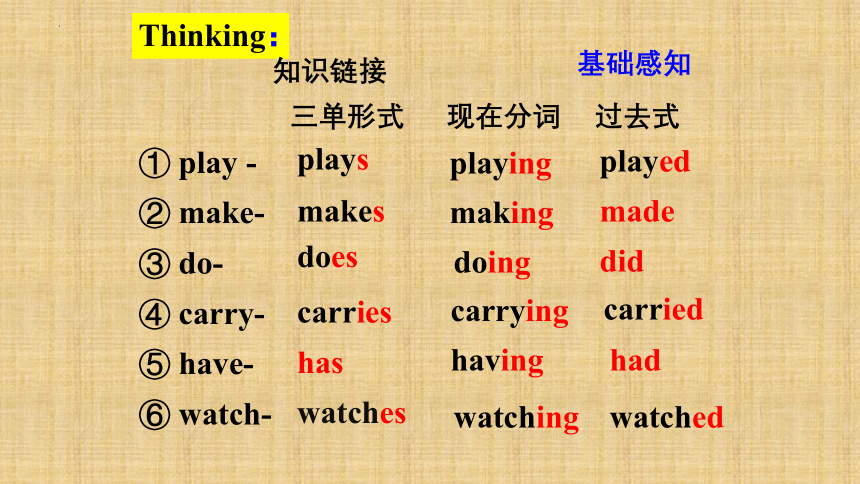
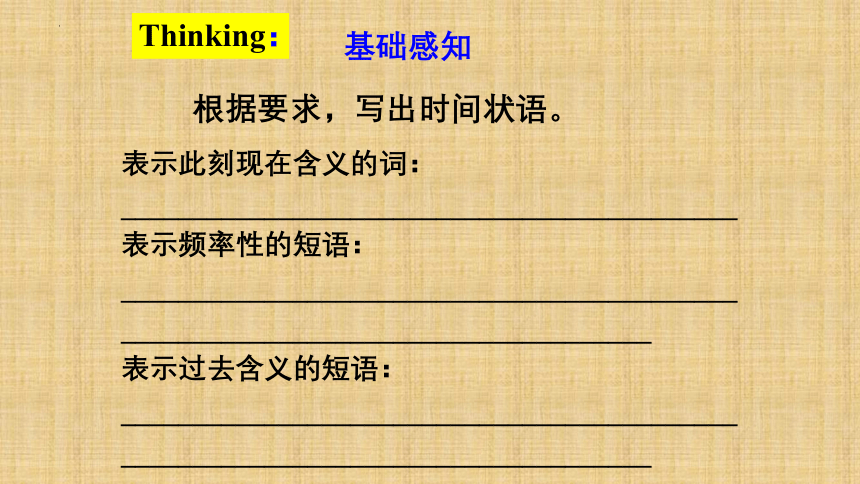
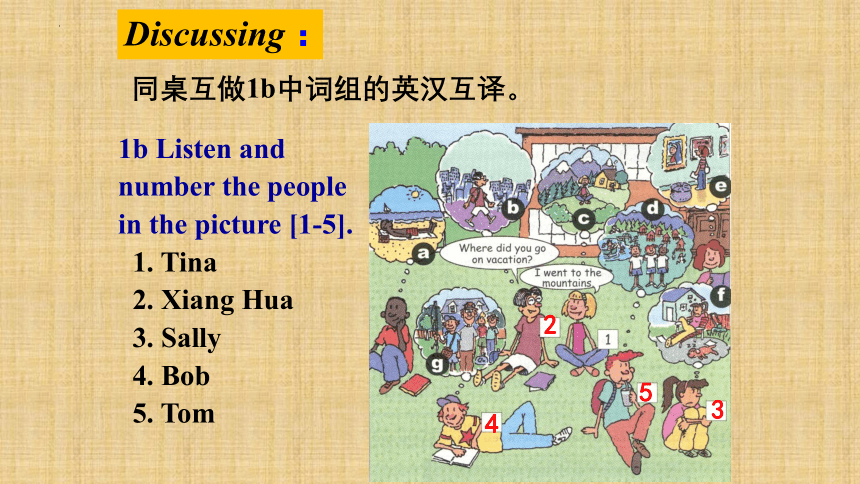
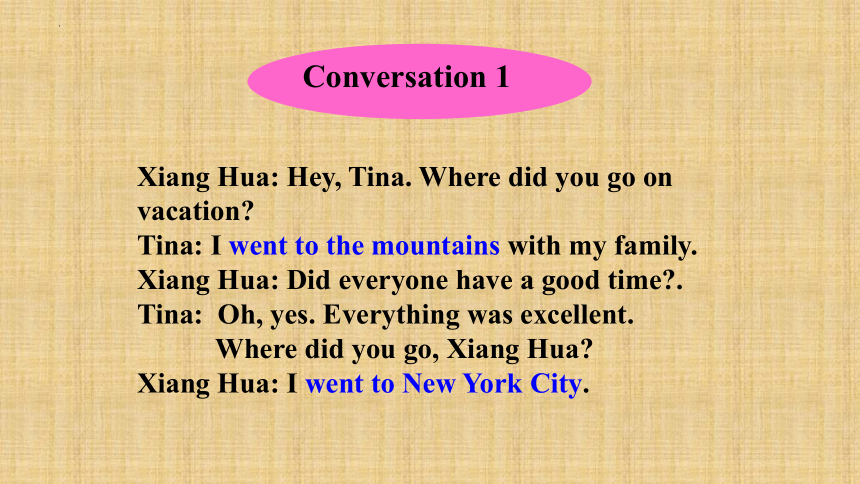
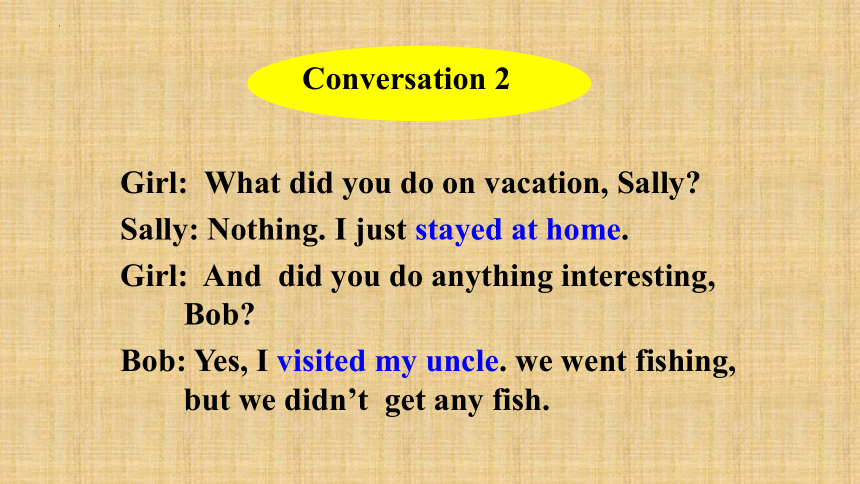
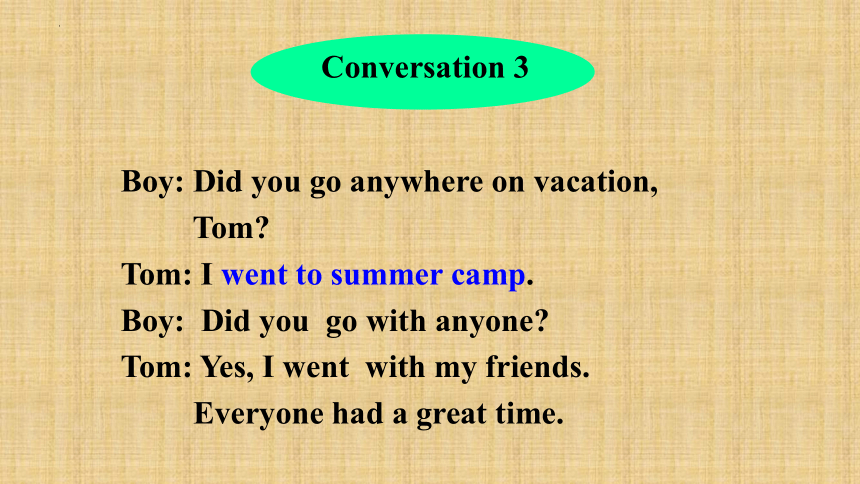
文档简介
(共42张PPT)
Unit 1 Where did you go on vacation
Section A (1a-2d)
T: Hello, everyone. Did you have a good vacation
Where did you go
on vacation
I went to the Great Wall for vacation.
Leading in:
Where did you go on vacation
went to the
mountains
stayed at home
went to the beach
Where did you go on vacation
went to New York City
visited my uncle
Where did you go on vacation
visited museums
went to summer camp
1. stayed at home f
2.went to New York City__
3.visited my uncle___
4.went to summer camp__
5.went to the mountains __
6.went to the beach ___
7.visited museums ___
1a Match the activities with the pictures.
a
c
b
g
d
e
Thinking:
三单形式
play -
make-
do-
carry-
have-
watch-
plays
makes
does
carries
has
watches
知识链接
现在分词
watching
having
carrying
playing
making
doing
carried
had
watched
did
played
made
基础感知
过去式
根据要求,写出时间状语。
表示此刻现在含义的词: ___________________________________________
表示频率性的短语:________________________________________________________________________________
表示过去含义的短语:________________________________________________________________________________
基础感知
Thinking:
1b Listen and
number the people
in the picture [1-5].
1. Tina
2. Xiang Hua
3. Sally
4. Bob
5. Tom
4
5
3
2
Discussing :
同桌互做1b中词组的英汉互译。
Conversation 1
Xiang Hua: Hey, Tina. Where did you go on vacation
Tina: I went to the mountains with my family.
Xiang Hua: Did everyone have a good time .
Tina: Oh, yes. Everything was excellent.
Where did you go, Xiang Hua
Xiang Hua: I went to New York City.
Conversation 2
Girl: What did you do on vacation, Sally
Sally: Nothing. I just stayed at home.
Girl: And did you do anything interesting, Bob
Bob: Yes, I visited my uncle. we went fishing, but we didn’t get any fish.
Conversation 3
Boy: Did you go anywhere on vacation,
Tom
Tom: I went to summer camp.
Boy: Did you go with anyone
Tom: Yes, I went with my friends.
Everyone had a great time.
一般过去时的含义:时间 谓语动词形式。
Discussing :
Make conversations about the people in the picture.
Where did Tina go on vacation
She went to the mountains.
Where did …
go on vacation
She/He …
1c
Showing :
How was his/her vacation
Great!
Where did he/she go
He/She went to the mountains.
Make your own conversations.
a
g
f
一般过去时
构成
用法
动词的过去式
1. 表示过去某个时间发
生的动作或存在的状态。
2. 表示过去经常或
反复发生的动作。
(the day before) yesterday
last night / week
in 1990 / just now刚才
two days ago
一般过去时
常用时间
Explaining:
1. 动词be的变化:
was
were
am
is
are
2. 助动词do的变化:
do→ did (在过去时里助动词do没有人称和数的变化)
如:Did you play soccer yesterday
Did he play soccer yesterday
动词过去式
的构成
规则动词
regular verbs
不规则动词
inregular verbs
(1) 一般情况下在动词后加-ed。
e.g. play—played visit—visited
walk—walked clean—cleaned
(2) 以不发音的e结尾的词,在词尾加-d。
e.g. like—liked dance—danced
(3) 前两辅与后一辅夹一元,要先双写最后一个辅音字母,再加-ed。
e.g. stop—stopped drop—dropped plan—planned
(4) 以辅音字母加 y 结尾的单词,先改 y为 i,再加-ed。
e.g. study—studied carry—carried
3. 实义动词的变化:实义动词分规则变化和不规则变化。
规则变化有以下几种:
不规则变化需要按一定的规律逐个记忆。
some- any- every- no-
人
物
anyone
someone
nothing
something
anything
everything
复合不定代词:
用法巧记:
(复合)不定代词谓用单,修饰词语放后边。
everyone
no one
go stay
play watch
visit practice
study do
have am / is
将下列词变为过去式
stayed
watched
played
visited
practiced
studied
did
had
was
went
Checking:
2a. Listen. Where did the people go on vacation Complete the chart.
People Places
Grace
Kevin
Julie
New York City
the beach
home
Listen again. Check (√) Yes, I did or No, I didn't for each question.
Did you… Yes, I did. No, I didn’t.
Grace go with anyone
go to Central Park
buy anything special
Kevin play volleyball
swim
meet anyone interesting
Julie do anything interesting
study for tests
go out with anyone
√
√
√
√
√
√
√
√
√
Conversation 1
Boy: Where did you go on vacation, Grace
Grace: I went to New York City.
Boy: Oh, really Did you go with anyone
Grace: Yes. I went with my mother.
Boy: Did you go to Central Park
Grace: Yes, I did. It was really nice.
Boy: Did you buy anything special
Grace: Yes. I bought something for my father.
Boy: Oh, really What
Grace: I bought him a hat.
2b listen and read
“Where+did+主语+动词原形+其他 ”
用来询问某人过去在什么地方做过某事。
1.由some-, any-, no-, every-构成的复合不定代词若有定语(如to do或形容词)修饰,该定语要置于其后。
2. anything一般用于否定句和疑问句中,用于肯定句时要改为something。
3. 复合不定代词作主语时,都作单数看待,其谓语动词要用第三人称单数形式。如: Everyone is in the classroom.每个人都在教室里。
Conversation 2
Girl: Where did you go on vacation, Kevin
Kevin: I went to the beach.
Girl: Oh, that’s nice. Did you play volleyball
Kevin: No, I didn’t.
Girl: Well, did you swim
Kevin: Yes, I did. The water was really warm.
Girl: How was the food
Kevin: Everything tasted really good!
Girl: Did you meet anyone interesting
Kevin: Yes. I met some very interesting people.
2b listen and read
Conversation 3
Boy: Where did you go on your vacation, Julie
Julie: I stayed at home.
Boy: Oh. So, did you do anything interesting
Julie: No, I didn’t.
Boy: Did you study for your tests
Julie: Yes, I did.
Boy: Did you go out with anyone
Julie: No. No one was here. Everyone was on vacation.
2b listen and read
Time to think: When asking about other people’s vacation, what other questions do we usually ask
Did you go with anyone
Did you buy anything special
Did you meet anyone interesting
Did you do anything interesting
Let’s role-play conversations between Grace, Kevin and Julie.
e.g.
A: Grace, where did you go on vacation
B: I went to New York City.
A: Oh, really Did you go with anyone
B: Yes, I went with my mother.
Rick and Helen are also talking about their vacation.
Did anything interesting take place
A:Where did you go on vacation
B: I went to the beach.
A: Oh, really Did you play volleyball
B: No, I didn’t. But I swam in the warm water.
A: Did you do anything special
B: Yes. I had good food and met some interesting people.
2c
Role-play
2d
Listen to the conversation and match the people with the right place.
Helen
Rick
Rick
Rick
Helen
Rick
Helen
Rick
2d
Read the conversation again and try to ask and answer questions with your partners.
Rick: Hi, Helen. Long time no see.
Helen: Hi, Rick. Yes, I was on vacation last month.
Rick: Oh, did you go anywhere interesting
Helen: Yes, I went to Guizhou with my
family.
Rick: Wow! Did you see Huangguoshu
Waterfall
Helen: Yes, I did. It was wonderful. We
took quite a few photos there.
What about you Did you do
anything special last month
Rick: Not really. I just stayed at home
most of the time to read and relax.
words & phrases
2d
度假
好久没见了
一些特殊的事
相当多
大部分时间
几处有趣的地方
Explanation
1. Did you buy anything special
在英语中,anything, something, nothing和everything是用于指代事物的复合不定代词,与之相对应的复合不定代词anyone, someone, no one和everyone (anybody, somebody, nobody和everybody) 用于指人。与形容词连用时,形容词必须置于复合不定词之后,语法上称作“后置”。
e.g. I can see someone new in your group.
There’s nothing interesting in the news today.
2. Did you go anywhere interesting
anywhere意为“在任何地方”,常用于一般疑问句或否定句中,代替somewhere。
e.g. I can’t find my keys anywhere.我到处也找不到我的钥匙。
3. We took quite a few photos there.
a few 一些,若干=some,后跟可数名词复数形式。
quite a few 意为“相当多;不少(=many)”后跟可数名词复数形式。
e.g. A few girls are playing volleyball. 几个女孩正在打排球。
There are quite a few birds in the forest.
在那片森林里有很多鸟。
4. I just stayed at home most of the time to read and relax.
most意为“大多数”,后跟可数名词或不可数名词均可。
e.g. Most students go to school on foot.
大多数学生步行去上学。
【辨析】
most + 名词 泛指多数,无范围;
most + of + the (this/that/those/these等)名词 ,指某一范围内的多数。
e.g. Most of the students go to school by bike.
这些学生们中的多数骑自行车去上学。
Exercise
根据汉语提示完成句子。
1. Did he go out with _______ (任何人)
2. They didn’t buy ________ ______ (特殊的东西) there yesterday.
3. Tell us __________ __________ (有趣的事情) about your vacation, Jenny.
4. They caught ______ ___ ____ (相当多的) insects in the forest.
5. _____ __ ___ (大多数) students can get to school early.
anyone
something interesting
anything special
quite a few
Most of the
1. Lucy did her homework yesterday evening. (改为否定句)
Lucy ______ __ _____ _________ yesterday evening.
2. I had lunch at my friend’s home.
(改为一般疑问句,并作肯定回答)
—____ you ______ _____ at your friend’s home
—______, ___ _____.
3. Jim went to the beach last Sunday. (对画线部分提问)
_____ _____ Jim ______ last Sunday
4. They played basketball yesterday. (对画线部分提问)
________ _______ they play basketball
5. The students had great fun in the park. (改为同义句)
The students _____ ______ ____ _______ in the park.
didn’t do her homework
Did have lunch
Yes I did
What did do
V. 根据要求改写下列句子。
When did
had a good / great time
Thank You!
Unit 1 Where did you go on vacation
Section A (1a-2d)
T: Hello, everyone. Did you have a good vacation
Where did you go
on vacation
I went to the Great Wall for vacation.
Leading in:
Where did you go on vacation
went to the
mountains
stayed at home
went to the beach
Where did you go on vacation
went to New York City
visited my uncle
Where did you go on vacation
visited museums
went to summer camp
1. stayed at home f
2.went to New York City__
3.visited my uncle___
4.went to summer camp__
5.went to the mountains __
6.went to the beach ___
7.visited museums ___
1a Match the activities with the pictures.
a
c
b
g
d
e
Thinking:
三单形式
play -
make-
do-
carry-
have-
watch-
plays
makes
does
carries
has
watches
知识链接
现在分词
watching
having
carrying
playing
making
doing
carried
had
watched
did
played
made
基础感知
过去式
根据要求,写出时间状语。
表示此刻现在含义的词: ___________________________________________
表示频率性的短语:________________________________________________________________________________
表示过去含义的短语:________________________________________________________________________________
基础感知
Thinking:
1b Listen and
number the people
in the picture [1-5].
1. Tina
2. Xiang Hua
3. Sally
4. Bob
5. Tom
4
5
3
2
Discussing :
同桌互做1b中词组的英汉互译。
Conversation 1
Xiang Hua: Hey, Tina. Where did you go on vacation
Tina: I went to the mountains with my family.
Xiang Hua: Did everyone have a good time .
Tina: Oh, yes. Everything was excellent.
Where did you go, Xiang Hua
Xiang Hua: I went to New York City.
Conversation 2
Girl: What did you do on vacation, Sally
Sally: Nothing. I just stayed at home.
Girl: And did you do anything interesting, Bob
Bob: Yes, I visited my uncle. we went fishing, but we didn’t get any fish.
Conversation 3
Boy: Did you go anywhere on vacation,
Tom
Tom: I went to summer camp.
Boy: Did you go with anyone
Tom: Yes, I went with my friends.
Everyone had a great time.
一般过去时的含义:时间 谓语动词形式。
Discussing :
Make conversations about the people in the picture.
Where did Tina go on vacation
She went to the mountains.
Where did …
go on vacation
She/He …
1c
Showing :
How was his/her vacation
Great!
Where did he/she go
He/She went to the mountains.
Make your own conversations.
a
g
f
一般过去时
构成
用法
动词的过去式
1. 表示过去某个时间发
生的动作或存在的状态。
2. 表示过去经常或
反复发生的动作。
(the day before) yesterday
last night / week
in 1990 / just now刚才
two days ago
一般过去时
常用时间
Explaining:
1. 动词be的变化:
was
were
am
is
are
2. 助动词do的变化:
do→ did (在过去时里助动词do没有人称和数的变化)
如:Did you play soccer yesterday
Did he play soccer yesterday
动词过去式
的构成
规则动词
regular verbs
不规则动词
inregular verbs
(1) 一般情况下在动词后加-ed。
e.g. play—played visit—visited
walk—walked clean—cleaned
(2) 以不发音的e结尾的词,在词尾加-d。
e.g. like—liked dance—danced
(3) 前两辅与后一辅夹一元,要先双写最后一个辅音字母,再加-ed。
e.g. stop—stopped drop—dropped plan—planned
(4) 以辅音字母加 y 结尾的单词,先改 y为 i,再加-ed。
e.g. study—studied carry—carried
3. 实义动词的变化:实义动词分规则变化和不规则变化。
规则变化有以下几种:
不规则变化需要按一定的规律逐个记忆。
some- any- every- no-
人
物
anyone
someone
nothing
something
anything
everything
复合不定代词:
用法巧记:
(复合)不定代词谓用单,修饰词语放后边。
everyone
no one
go stay
play watch
visit practice
study do
have am / is
将下列词变为过去式
stayed
watched
played
visited
practiced
studied
did
had
was
went
Checking:
2a. Listen. Where did the people go on vacation Complete the chart.
People Places
Grace
Kevin
Julie
New York City
the beach
home
Listen again. Check (√) Yes, I did or No, I didn't for each question.
Did you… Yes, I did. No, I didn’t.
Grace go with anyone
go to Central Park
buy anything special
Kevin play volleyball
swim
meet anyone interesting
Julie do anything interesting
study for tests
go out with anyone
√
√
√
√
√
√
√
√
√
Conversation 1
Boy: Where did you go on vacation, Grace
Grace: I went to New York City.
Boy: Oh, really Did you go with anyone
Grace: Yes. I went with my mother.
Boy: Did you go to Central Park
Grace: Yes, I did. It was really nice.
Boy: Did you buy anything special
Grace: Yes. I bought something for my father.
Boy: Oh, really What
Grace: I bought him a hat.
2b listen and read
“Where+did+主语+动词原形+其他 ”
用来询问某人过去在什么地方做过某事。
1.由some-, any-, no-, every-构成的复合不定代词若有定语(如to do或形容词)修饰,该定语要置于其后。
2. anything一般用于否定句和疑问句中,用于肯定句时要改为something。
3. 复合不定代词作主语时,都作单数看待,其谓语动词要用第三人称单数形式。如: Everyone is in the classroom.每个人都在教室里。
Conversation 2
Girl: Where did you go on vacation, Kevin
Kevin: I went to the beach.
Girl: Oh, that’s nice. Did you play volleyball
Kevin: No, I didn’t.
Girl: Well, did you swim
Kevin: Yes, I did. The water was really warm.
Girl: How was the food
Kevin: Everything tasted really good!
Girl: Did you meet anyone interesting
Kevin: Yes. I met some very interesting people.
2b listen and read
Conversation 3
Boy: Where did you go on your vacation, Julie
Julie: I stayed at home.
Boy: Oh. So, did you do anything interesting
Julie: No, I didn’t.
Boy: Did you study for your tests
Julie: Yes, I did.
Boy: Did you go out with anyone
Julie: No. No one was here. Everyone was on vacation.
2b listen and read
Time to think: When asking about other people’s vacation, what other questions do we usually ask
Did you go with anyone
Did you buy anything special
Did you meet anyone interesting
Did you do anything interesting
Let’s role-play conversations between Grace, Kevin and Julie.
e.g.
A: Grace, where did you go on vacation
B: I went to New York City.
A: Oh, really Did you go with anyone
B: Yes, I went with my mother.
Rick and Helen are also talking about their vacation.
Did anything interesting take place
A:Where did you go on vacation
B: I went to the beach.
A: Oh, really Did you play volleyball
B: No, I didn’t. But I swam in the warm water.
A: Did you do anything special
B: Yes. I had good food and met some interesting people.
2c
Role-play
2d
Listen to the conversation and match the people with the right place.
Helen
Rick
Rick
Rick
Helen
Rick
Helen
Rick
2d
Read the conversation again and try to ask and answer questions with your partners.
Rick: Hi, Helen. Long time no see.
Helen: Hi, Rick. Yes, I was on vacation last month.
Rick: Oh, did you go anywhere interesting
Helen: Yes, I went to Guizhou with my
family.
Rick: Wow! Did you see Huangguoshu
Waterfall
Helen: Yes, I did. It was wonderful. We
took quite a few photos there.
What about you Did you do
anything special last month
Rick: Not really. I just stayed at home
most of the time to read and relax.
words & phrases
2d
度假
好久没见了
一些特殊的事
相当多
大部分时间
几处有趣的地方
Explanation
1. Did you buy anything special
在英语中,anything, something, nothing和everything是用于指代事物的复合不定代词,与之相对应的复合不定代词anyone, someone, no one和everyone (anybody, somebody, nobody和everybody) 用于指人。与形容词连用时,形容词必须置于复合不定词之后,语法上称作“后置”。
e.g. I can see someone new in your group.
There’s nothing interesting in the news today.
2. Did you go anywhere interesting
anywhere意为“在任何地方”,常用于一般疑问句或否定句中,代替somewhere。
e.g. I can’t find my keys anywhere.我到处也找不到我的钥匙。
3. We took quite a few photos there.
a few 一些,若干=some,后跟可数名词复数形式。
quite a few 意为“相当多;不少(=many)”后跟可数名词复数形式。
e.g. A few girls are playing volleyball. 几个女孩正在打排球。
There are quite a few birds in the forest.
在那片森林里有很多鸟。
4. I just stayed at home most of the time to read and relax.
most意为“大多数”,后跟可数名词或不可数名词均可。
e.g. Most students go to school on foot.
大多数学生步行去上学。
【辨析】
most + 名词 泛指多数,无范围;
most + of + the (this/that/those/these等)名词 ,指某一范围内的多数。
e.g. Most of the students go to school by bike.
这些学生们中的多数骑自行车去上学。
Exercise
根据汉语提示完成句子。
1. Did he go out with _______ (任何人)
2. They didn’t buy ________ ______ (特殊的东西) there yesterday.
3. Tell us __________ __________ (有趣的事情) about your vacation, Jenny.
4. They caught ______ ___ ____ (相当多的) insects in the forest.
5. _____ __ ___ (大多数) students can get to school early.
anyone
something interesting
anything special
quite a few
Most of the
1. Lucy did her homework yesterday evening. (改为否定句)
Lucy ______ __ _____ _________ yesterday evening.
2. I had lunch at my friend’s home.
(改为一般疑问句,并作肯定回答)
—____ you ______ _____ at your friend’s home
—______, ___ _____.
3. Jim went to the beach last Sunday. (对画线部分提问)
_____ _____ Jim ______ last Sunday
4. They played basketball yesterday. (对画线部分提问)
________ _______ they play basketball
5. The students had great fun in the park. (改为同义句)
The students _____ ______ ____ _______ in the park.
didn’t do her homework
Did have lunch
Yes I did
What did do
V. 根据要求改写下列句子。
When did
had a good / great time
Thank You!
同课章节目录
- Unit 1 Where did you go on vacation?
- Section A
- Section B
- Unit 2 How often do you exercise?
- Section A
- Section B
- Unit 3 I'm more outgoing than my sister.
- Section A
- Section B
- Unit 4 What's the best movie theater?
- Section A
- Section B
- Unit 5 Do you want to watch a game show?
- Section A
- Section B
- Unit 6 I'm going to study computer science.
- Section A
- Section B
- Unit 7 Will people have robots?
- Section A
- Section B
- Unit 8 How do you make a banana milk shake?
- Section A
- Section B
- Unit 9 Can you come to my party?
- Section A
- Section B
- Unit 10 If you go to the party, you'll have a grea
- Section A
- Section B
